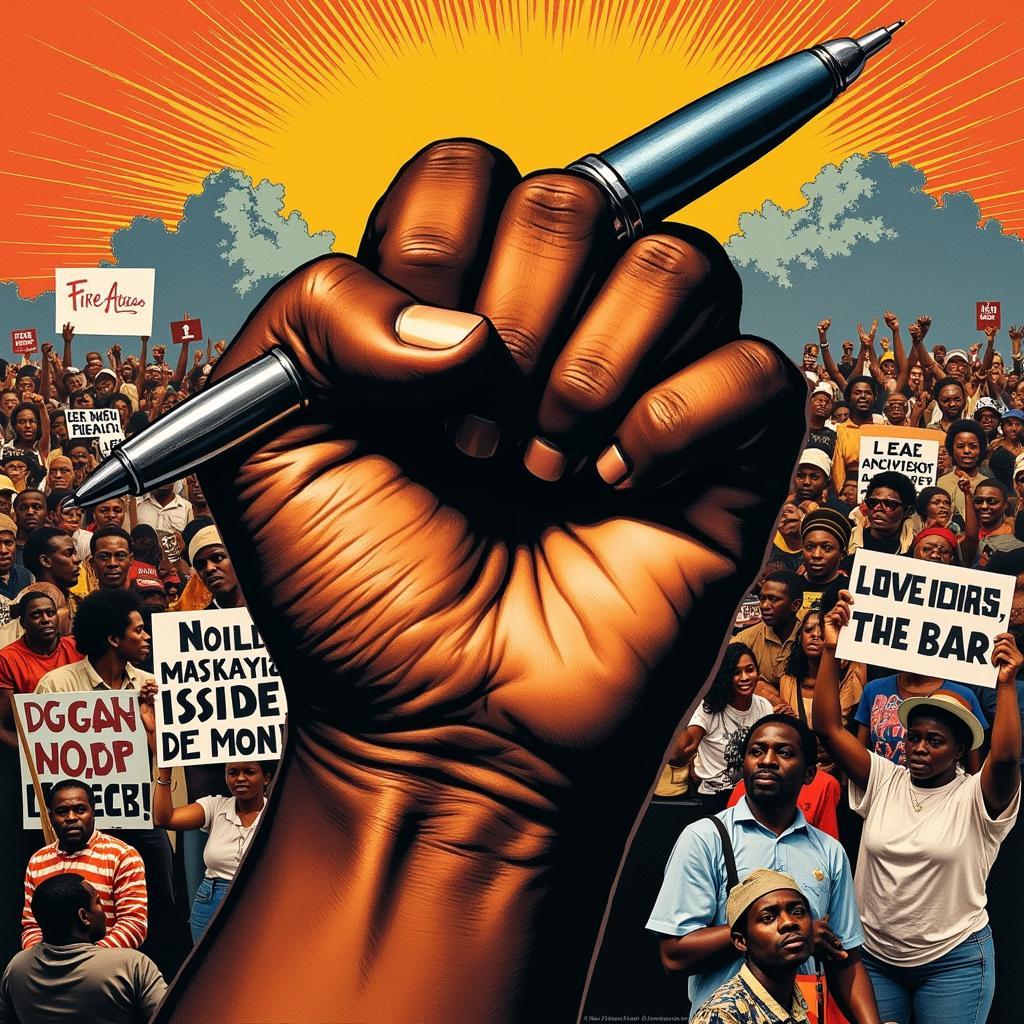Exploring the African Diaspora Through Poetry
The African diaspora, a complex and multifaceted history of forced migration and cultural resilience, has found powerful expression in poetry. African Diaspora Poems offer a unique lens through which to examine themes of displacement, identity, memory, and the ongoing struggle for liberation. These poems serve as a testament to the enduring human spirit and the power of art to transcend boundaries. Let’s delve into the world of African diaspora poetry.
The Power of Voice in African Diaspora Poetry
African diaspora poetry gives voice to experiences often silenced or marginalized. It provides a platform for individuals and communities to share their stories, struggles, and triumphs in their own words. This reclamation of narrative is a crucial aspect of healing and empowerment. From the transatlantic slave trade to contemporary migrations, poetry has served as a vital tool for documenting and processing the trauma of displacement. One of the recurring themes in these poems is the search for identity and belonging in new and often hostile environments. The poetry explores the complexities of navigating multiple cultural influences and the challenges of reconciling ancestral roots with present realities.
The syllabus for African American Studies often includes in-depth exploration of these themes. Learn more about resources available through an African American studies syllabus.
Memory and Ancestral Legacy in Verse
Memory plays a significant role in African diaspora poetry, serving as a bridge between past and present. Poets often evoke ancestral memories and historical narratives to connect with their roots and reclaim their heritage. This act of remembrance is not only a form of honoring the past but also a powerful tool for understanding the present. By exploring the legacy of slavery, colonialism, and other forms of oppression, these poems illuminate the ongoing impact of these historical events on contemporary society. This intergenerational dialogue is essential for healing and fostering a sense of collective identity. Through vivid imagery and evocative language, poets transport readers to different times and places, allowing them to experience the past in a visceral and meaningful way.
The Influence of African and Caribbean Rhythms
The musicality of language is a defining characteristic of much African diaspora poetry. The influence of African and Caribbean rhythms, oral traditions, and musical forms can be heard in the cadence, rhyme, and repetition often employed by poets. This rhythmic quality adds another layer of meaning to the poems, enhancing their emotional impact and creating a sense of shared cultural heritage. Learn more about the interplay of these cultures by exploring resources on African and Caribbean connections. These rhythmic patterns also create a sense of community and shared experience, connecting readers to the rich oral traditions of the African diaspora.
“The rhythm is not just decoration; it’s the heartbeat of the poem, connecting us to the ancestral drum,” says Dr. Abena Osei, a renowned scholar of African diaspora literature.
Struggle and Liberation in Poetic Expression
The theme of struggle and liberation is central to much of African diaspora poetry. These poems often explore the ongoing fight for social justice, equality, and self-determination. They serve as a powerful tool for resistance and activism, challenging systems of oppression and inspiring hope for a better future. From protests against racial injustice to celebrations of cultural pride, poetry has played a vital role in the struggle for liberation. The poems give voice to the marginalized and amplify their calls for change, creating a space for dialogue and collective action. The poetic expression serves as a catalyst for social change, challenging readers to confront injustice and work towards a more equitable future.
Explore more about cultural heritage through the lens of literature by delving into African cultural heritage resources.
 African Diaspora Poetry: Struggle, Liberation, and Resistance
African Diaspora Poetry: Struggle, Liberation, and Resistance
Contemporary African Diaspora Poets
The landscape of African diaspora poetry continues to evolve with new voices and perspectives emerging. Contemporary poets are pushing the boundaries of the genre, experimenting with form, language, and themes. They are engaging with contemporary issues such as globalization, technology, and climate change, while also continuing to explore the enduring themes of identity, memory, and belonging. These poets are forging new paths and creating powerful works that resonate with audiences around the world. “Contemporary poets are building on the legacy of their predecessors, adding their unique voices to the ongoing conversation about what it means to be part of the African diaspora,” notes Kwame Asante, a prominent literary critic.
You can delve further into the world of poetry by exploring a curated list of African English poets. Additionally, a helpful resource for academics is the African diaspora syllabus university 2017.
Conclusion
African diaspora poems offer a powerful and poignant exploration of the human experience. Through their words, poets illuminate the complexities of identity, memory, struggle, and resilience. These poems are a testament to the enduring power of the human spirit and the vital role of art in shaping our understanding of the world. Exploring African diaspora poetry is a journey into the heart of a global community connected by shared history and a vibrant cultural heritage. Continue your exploration of this rich literary tradition to gain a deeper understanding of the African diaspora and its ongoing impact on the world.
FAQ
- What is the African diaspora?
- What are some common themes in African diaspora poetry?
- Who are some prominent African diaspora poets?
- Where can I find resources on African diaspora literature?
- How has African diaspora poetry influenced other art forms?
- What is the significance of oral tradition in African diaspora poetry?
- How does contemporary African diaspora poetry address current social issues?
Need Help?
For any assistance, please contact us:
Phone: +255768904061
Email: [email protected]
Address: Mbarali DC Mawindi, Kangaga, Tanzania.
We have a 24/7 customer support team.


